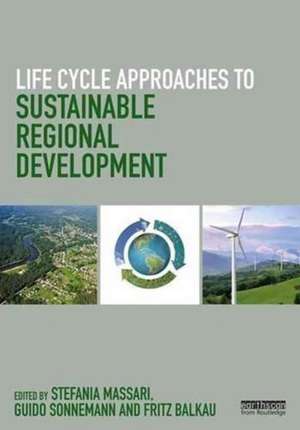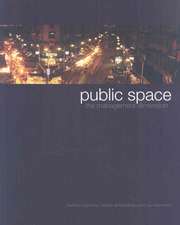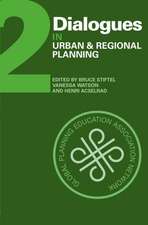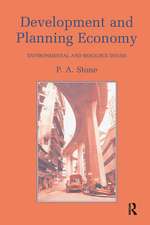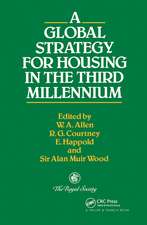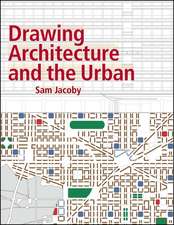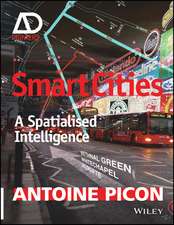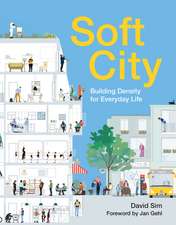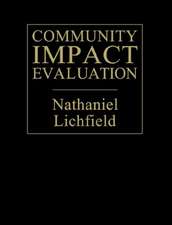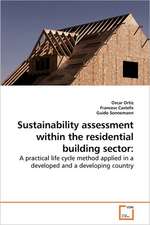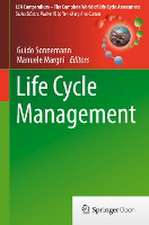Life Cycle Approaches to Sustainable Regional Development
Editat de Stefania Massari, Guido Sonnemann, Fritz Balkauen Limba Engleză Hardback – 20 dec 2016
Preț: 770.31 lei
Preț vechi: 1031.00 lei
-25% Nou
Puncte Express: 1155
Preț estimativ în valută:
147.40€ • 154.29$ • 122.68£
147.40€ • 154.29$ • 122.68£
Carte tipărită la comandă
Livrare economică 31 martie-14 aprilie
Preluare comenzi: 021 569.72.76
Specificații
ISBN-13: 9781138940604
ISBN-10: 1138940607
Pagini: 362
Ilustrații: 55
Dimensiuni: 174 x 246 x 25 mm
Greutate: 0.79 kg
Ediția:1
Editura: Taylor & Francis
Colecția Routledge
Locul publicării:Oxford, United Kingdom
ISBN-10: 1138940607
Pagini: 362
Ilustrații: 55
Dimensiuni: 174 x 246 x 25 mm
Greutate: 0.79 kg
Ediția:1
Editura: Taylor & Francis
Colecția Routledge
Locul publicării:Oxford, United Kingdom
Public țintă
Professional Practice & DevelopmentCuprins
Preface
Foreward
Section 1. Introduction – Providing the context
Foreward
Section 1. Introduction – Providing the context
1. SummarySection 2. Analytical basis for life cycle approaches
2. Sustainable regional development in a life cycle context (Fritz Balkau, Stefania Massari, Guido Sonnemann)
3. Regional development and frameworks for sustainable development (Donatella Porrini, Fabrizio Striani)
4. Financial instruments and procedures for sustainable regional development investments (William Rivenbark, Fritz Balkau)
5. Life cycle approaches to improve resource efficiency in a regional context (Guido Sonnemann, Philip Strothmann, Fritz Balkau)
6. Life cycle management for regions (Fritz Balkau, Guido Sonnemann)
7. Ecological footprint principles and methodology (Marcello Ruberti, Stefania Massari)Section 3. Converting analysis into life cycle tools
8. Environmentally extended input output analysis for sustainable regional development (Eskinder Gemechu, Guido Sonnemann. Francesc Castells, Isabela Butnar, Maria Llop)
9. Material flow accounts (Aldo Femia, Renato Marra Campanale)
10. Life cycle assessment - LCA (Giuseppe Tassielli, Pietro Renzulli, Bruno Notarnicola)
11. Carbon footprint principles (Harish Jeswani)
12. Water footprint principles (Philippe Loubet, Guido Sonnemann)
13. System dynamic and spatial modelling in LCA (Bertrand Laratte, Guido Sonnemann)
14. Towards life cycle sustainability assessment, including social life cycle assessment (Bernard Mazijn)
15. Organizational life cycle assessment for regional and local organizations (Julia Martinez-Blanco, Atsushi Inaba, Matthias Finkbeiner)
16. Certification, standardisation and instruments for regional sustainable development- a life cycle view (Cristiana Reho, Pia Wiche)Section 4. Using life cycle approaches at regional level
17. Eco-design and Product-Service Systems (Ben Walker)
18. Eco-labels in sustainable development (Ben Walker)
19. Life cycle basis of sustainable procurement (Fritz Balkau)
20. Industrial ecology and sustainable performance of business parks (Jean-François Valles)
21. Natural resource use efficiency and economic productivity (Pierluigi Toma, Stefania Massari, Pier Paolo Miglietta)
22. Environmental and Landscape Management System ( ELMS) (Riccardo Beltramo)
23. Environmental product declarations to support regional development (Annik M. Fet)
24. Ecological footprint: a local policy perspective (Pier Paolo Miglietta, Federica De Leo, Pierluigi Toma)Section 5. Integrated use of life cycle approaches in key economic sectorS
25. Economic analysis of regional sustainability – Hungary (Klara Szita Tóthné, Judit Roncz)
26. Circular economy and regional implications (Fritz Balkau)
27. Life cycle management for regional development in France: example of building sector (Naeem Adibi, Marie Darul, Vanessa Pasquet, Christelle Demaretz, Christian Traisnel)
28. From product LCAs to territorial LCAs: methodological principles (Eleonore Loiseau, Philippe Roux)
29. Integrated life cycle and risk assessment of human health impacts in Catalonia (Guido Sonnemann, Marta Schuhmacher, Francesc Castells)
30. LCA application in regional waste management in Chile (Alberto Bezama)
31. Water footprint assessment at the regional level (Guoping Zhang, Mesfin M. Mekonnen)
32. Carbon footprint of biofuels (Harish Jeswani)
33. Sustainable procurement based on life cycle costing (Bernard Mazijn)
34. Sustainable performance of industrial parks (Jean-François Valles)
35. Sustainable redevelopment of degraded land and landscapes (Peter Whitbread-Abrutat)
36. Sustainable agri-food chains and LCA (Bruno Notarnicola, Pietro Renzulli, Giuseppe Tassielli)Section 6. Life cycle perspectives for regional socio-economic development
37. Integration of LCA, LCC and social LCA for assessing a bioeconomy region (Alberto Bezama, Anke Siebert, Jakob Hildebrandt, Daniela Thrän)
38. Responsible Mining – from a life cycle to a stewardship approach (Ross Hamilton, Andrew S. Parsons)
39. Trends and Considerations of Renewable Energy Development: A Regional Perspective (Mark Radka, Giulia Ferrini, Agathe Laure, Ravina Brizmohun)
40. Closing the loop: the example of Packaging (Massimo Lombardi)
41. Life cycle aspects of the Walloon wood sector (Nelle Thyssen, Vanessa Zeller )
42. Global warming assessment of Himalayan buildings (Silu Bhochhibhoya, Raffaele Cavalli)
43. Integrated waste management and resource recovery in India (Asha Panwar)
44. Biodiversity restoration and sustainable tourism in South-western Australia (Keith Bradby)
45. Synthesis – Life cycle approaches and perspectives for sustainable regional development (Guido Sonnemann, Fritz Balkau)
Notă biografică
Stefania Massari became full Professor in Commodity Sciences in 2004. She works at the Faculty of Economics at the University of Salento, Lecce, Italy. She is the Coordinator of the degree courses in the business area of the Faculty and she is the Director of the 'Life cycle approaches to sustainable regional development' summer school. She holds an MSc in Biology from the University of Bari. She did research at UNEP Paris and King’s College London.
Guido Sonnemann is full Professor at the University of Bordeaux, France, where he heads a research group on life cycle assessment in the Institute of Molecular Sciences at the Department of Sciences and Technology. From 2002 to 2012, he worked as UNEP Programme Officer for Innovation and Life Cycle Management in Paris. In this function, he served as Science Focal Point for UNEP’s Resource Efficiency subprogramme. Guido holds a PhD in Chemical Engineering from the University Rovira and Virgili, Spain (2002), and an MSc in Environmental Chemistry from the University of Poitiers, France (1996), and he graduated as an environmental engineer from the Technical University of Berlin, Germany (1995).
Fritz Balkau is an independent international advisor on sustainable development, focusing on sustainable production and consumption practices, enhanced resource efficiency, and risk reduction in society. He has extensive environmental policy experience in government (Australia) and intergovernmental organisations, and has carried out professional consultancy projects for national governments and independent associations, as well as the OECD and UN.
Guido Sonnemann is full Professor at the University of Bordeaux, France, where he heads a research group on life cycle assessment in the Institute of Molecular Sciences at the Department of Sciences and Technology. From 2002 to 2012, he worked as UNEP Programme Officer for Innovation and Life Cycle Management in Paris. In this function, he served as Science Focal Point for UNEP’s Resource Efficiency subprogramme. Guido holds a PhD in Chemical Engineering from the University Rovira and Virgili, Spain (2002), and an MSc in Environmental Chemistry from the University of Poitiers, France (1996), and he graduated as an environmental engineer from the Technical University of Berlin, Germany (1995).
Fritz Balkau is an independent international advisor on sustainable development, focusing on sustainable production and consumption practices, enhanced resource efficiency, and risk reduction in society. He has extensive environmental policy experience in government (Australia) and intergovernmental organisations, and has carried out professional consultancy projects for national governments and independent associations, as well as the OECD and UN.
Descriere
Life Cycle Approaches to Sustainable Regional Planning and Development economic development by adopting more systematic and long-term criteria for decision-making. The book first examines life-cycle practices from a scientific point of view, then examines actual case studies of regional initiatives using such techniques.
